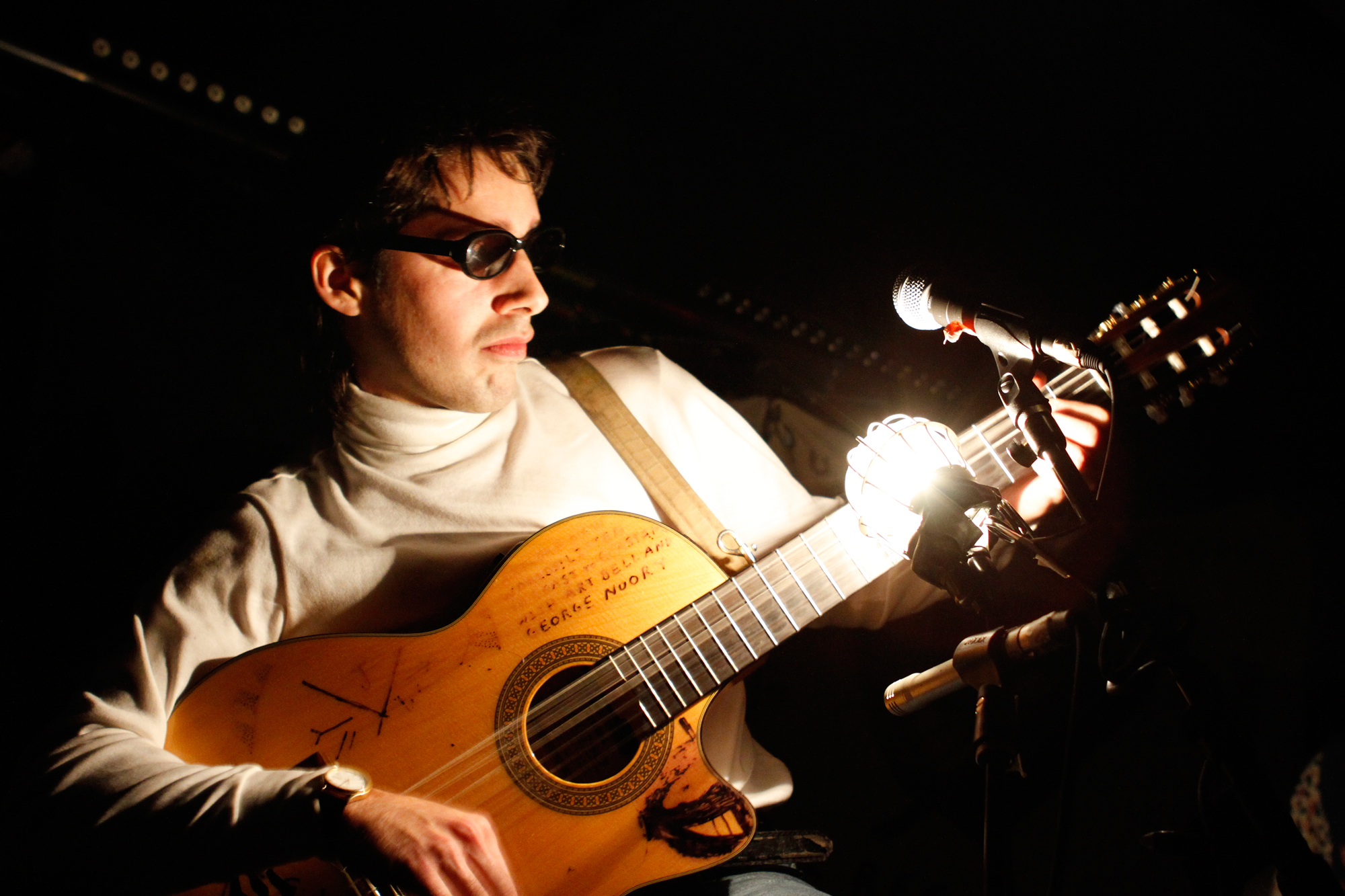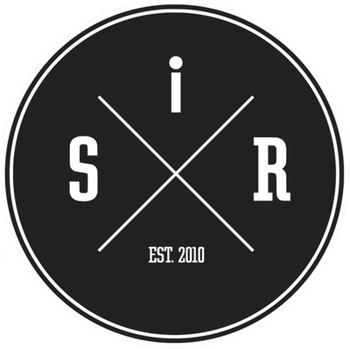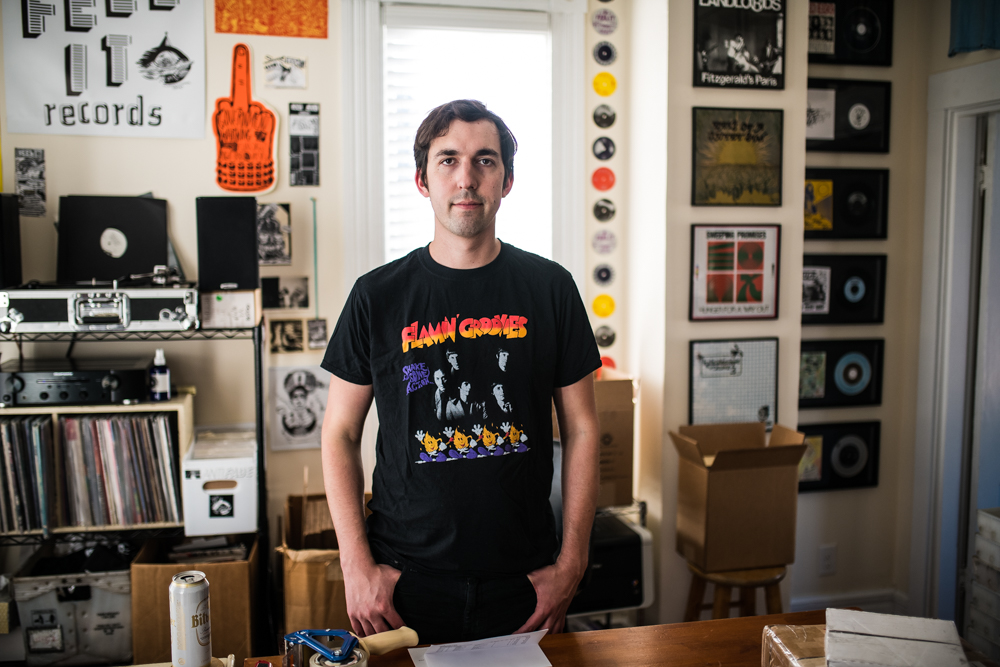For Juan Wauters‘ Interview, Still in Rock decided to go straightforward, to be very frank. Juan’s answers are made of the same material. The resultat? A very sincere exchange with an intriguing artist. His first LP, N.A.P. North American Poetry is as pretentious as it is unique. Here’s then the poetry-interview of the month.
Pour l’interview de Juan Wauters, Still in Rock a décidé de poser des questions très franches, directes, sans prendre de pincettes. Les réponses de Juan sont du même ordre. En ressort un interview d’une rare sincérité. Un véritable échange avec un artiste qui intrigue. Son premier album, N.A.P. North American Poetry est tout autant prétentieux qu’unique. Voici donc l’interview poésie du mois.

————–
TO INTRODUCE YOU
How would you describe your music to someone who has not heard about you yet?
Comment décrirais-tu ta musique à quelqu’un qui ne te connaît pas encore ?
Hi, the music that I play is based around the idea of songwriting. Meaning, the music comes in a song format. What is a song? I am not sure about that. I like the length and format of a radio song. I work around that and I try to find a sound and write songs that describe me as a person.
La musique que je joue est construite autour du songwriting. Je veux dire par là qu’elle vient à travers un format, une structure. Quelle structure ? Je ne sais pas vraiment. J’aime le format radio. Je travaille autour de cette idée et j’essaie toujours de créer des titres qui me correspondent.
—
What is be the best place to listen to your music?
Quel est le meilleur endroit pour écouter ta musique ?
In New York.
—
How did you meet Carmelle Safdie?
Comment as-tu rencontré Carmelle Sadfie ?
I met Carmelle Safdie playing shows. She used to play in a band named Beachnicks and my band, The Beets, would play with them. I really liked the way she sang since the first I saw her sing. I really liked her voice tone and also how she controlled her performance. When I was recording the songs that ended up in N.A.P. there were some songs that did not fit my vocal sound and I thought of Carmelle since we had been singing together occasionally. I think she adds a lot to the record. I am really glad with her contribution to the record and the live show.
Carmelle Sadie jouait pour un groupe, Beachnicks, et mon groupe, The Beets, jouait avec eux. J’aimais beaucoup la façon qu’elle avait de chanter. La tonalité de sa voix, et le contrôle de ses performances. Lorsque je me suis mis a enregistrer les titres qui ont fini sur N.A.P., je me suis rendu compte que ma voix ne produisait pas l’effet recherché sur plusieurs d’entre eux. J’ai donc demandé à Carmelle de les chanter. Finalement, je trouve qu’elle ajoute beaucoup à cet album. Je suis très heureux de sa contribution sur la version studio, ainsi qu’en live.
YOUR INFLUENCES
How do you bring influence from Uruguay in your music?
Comment importes-tu les influences de l’Uruguay dans ta musique ?
I am not sure about that. I don’t think about music like that. I see my music as sounds that I put together. Uruguay plays a very important part in my personality, so undoubtedly it will show in the music.
Je ne sais pas trop. Je ne pense pas à la musique de cette façon. Je perçois ma musique comme des sons que j’associe. L’Uruguay occupe une place très importante dans la personne que je suis, et ça se ressent indéniablement dans ma musique.
—
There is a lot of folk music going on in Uruguay, and not so much in Brooklyn. Why that do you think?
Il y a beaucoup de folk en Uruguay, moins à Brooklyn. As-tu une explication à cela ?
I am not sure about that.
Je ne sais pas.
—
You sing in english and spanish. How do you choose which language you’re going to use on a song?
Tu chantes en englais et en espagnol. Comment choisis tu quel language tu vas utiliser pour chaque titre ?
I don’t think about that when writing a song. I sometimes sing in English and some other times in Spanish. I remember when I first started to write songs, I made the decision to write in English because I was in New York and even though, I knew there were a lot of Spanish-speaking people there, I knew that by singing in English I could reach a much broader audience.
Je ne pense pas à cela lorsque j’écris une chanson. Je chante en anglais et en espagnol de façon alternative. Je me souviens que lorsque j’ai commencé à composer, j’ai fait la décision d’écrire en anglais parce que je vivais à New York, et bien que je connusse beaucoup de gens qui parlaient anglais et espagnol, mais je pensais que l’anglais me permettrait d’atteindre une audience plus large.
—
You left Uruguay in 2002 to live in a basement in Queens. Why did you decide to leave your country? What it the musician dream? Do you feel like it’s harder to become an accomplished musician in Uruguay?
Tu as quitté l’Uruguay en 2002 pour venir vivre dans le Queens. Pourquoi as-tu choisi de quitter ton pays ? Etait-ce le fameux Rêve Americain ? Etait-ce parce qu’il est plus dur de devenir un musicien accompli en Uruguay ?
I came to New York as a teenager and it was my parents’ decision to reestablish our family in this city. I started playing music in NewYork. It was a hobby that became a pattern in my life and I kept doing it. During my first five years in New York, I was taking care of things that had to do with me learning the ropes of the country and getting established. Then, slowly, I started to give music and my creation an opportunity to be one of the main focuses in my life.
Je suis arrivé à New York lorsque j’étais adolescent, sur la décision de mes parents de rassembler notre famille ici. J’ai donc commencé à jouer de la musique à New York. C’était une passion qui est devenue ma raison de vivre. Durant mes premières années à New York, je passais beaucoup de temps à apprendre à connaitre la culture américaine, à m’implanter. Et puis, doucement, j’ai donné de plus en plus d’importance à la musique.
—
On stage, musician from all around the world are playing with you: Israel, Argentina, Mexico, Japan. Are you afraid of becoming a New York musician for New yorker only?
Des musiciens du monde entier jouent avec toi sur scène : Israel, Argentine, Mexique, Japon… As-tu peur de devenir un musicien de New York pour les New Yorkais seulement ?
No. I am not afraid of that. New York is a very cosmopolitan place, so it makes sense to me to be playing with people with different backgrounds.
Je n’ai pas peur de cela. New York est un lieu très cosmopolitain, je trouve que ça fait sens de jouer avec des gens de tant d’horizons différents.
—
Is there a hipster/underground culture in Uruguay?
Y-a-t’il une culture hipster/underground en Uruguay ?
I am not sure about that. I don’t spend time there enough to know about that.
Je ne sais pas. Je n’y ai pas passé assez de temps.
—
What influence New York has on your music? What would be different on your LP if you were still leaving in Urugay (except for the label…)?
Quelle influence New York a sur ta musique ? En d’autres mots, qu’est ce qui serait différent sur ton LP si tu vivais toujours en Uruguay (mise à part le label) ?
New York has an energy that encourages people to do their own thing. I feel that the city has given me the opportunity to try to find myself as an artist in a way that encourages me to search for myself within myself. In this city I have felt that I do not need to sing in any specific way to fit any sort of trend passing. I really appreciate that about New York.
New York dégage cette énergie qui encourage les gens à faire ce qu’ils veulent vraiment. Cette ville ma donné l’opportunité de me trouver en tant qu’artiste. Dans cette ville, je ressens le besoin de chanter d’une façon particulière pour m’adapter aux tendances. J’aime beaucoup cela.

N.A.P. NORTH AMERICAN POETRY
Why did you call your album N.A.P. North American Poetry?
Pourquoi avoir appelé ton album N.A.P. North American Poetry ?
N.A.P. is an acronym that stands for North American Poetry. N.A.P. is the name of a poetry magazine that Matthew Volz, my main collaborator, and I put together last year. We never released any more issues after the first one. I am sure we will come back to it sometime. We felt that the title fit with the record and we went ahead and named it that.
N.A.P. est un acronyme de North American Poetry. N.A.P. est le nom d’un magazine de poésie que j’ai créé l’an dernier avec Matthew Volz. On a jamais fait paraître plus d’un seul numéro. Mais on reviendra, un jour. Quoi qu’il en soit, on a eu le sentiment que le nom collait bien à l’album, alors nous y voilà.
—
What is NAP North American Poetry really about?
De quoi parle-t-il ?
The album has a lot of meanings to me but I really encourage the listener to find their own.
Cet album a beaucoup de significations pour moi, mais je crois qu’il encourage fondamentalement l’auditeur à trouver sa propre interprétation.
—
What is your favorite song on it?
Quel est ton titre préféré ?
Now I like “Escucho Mucho” but I always change. I like them all.
En ce moment, c’est “Escucho Mucho“, mais ça tourne. Je les aime tous.
—
The video clip of the song “Sanity Or Not” is clearly awesome. Who did it, what is the story behind it ?
La vidéo du titre “Sanity Or Not” est assez géniale. Qui l’a réalisé ? Quelle est l’histoire qui se cache derrière ?
Matthew Volz did it. He is in charge of all the visual aesthetics of the project. Apart form the cover photo on N.A.P. that was taken by Carmelle Safdie, Matthew did all the art work on the record. Besides that he does all the videos, and all the different visual aspects of the project, he is currently running a whole stage show, including a live light show. We work together a lot so we contribute to each other’s ideas constantly.
The video for “Sanity” developed from a sequence of shots that Matt and I were filming on at the time. Matt wanted to have something to do with wrestler, Andy Kaufman. It all developed from there.
Matthew Volz l’a réalisé. Il est en charge de tout l’aspect visuel du projet, sauf pour l’artwork de N.A.P. qui est une photo prise par Carmelle Safdie. Matthew réalise d’ailleurs un spectacle de lumière en ce moment. On travail toujours ensemble, donc on partage beaucoup et on s’influence mutuellement.
La vidéo de “Sanity” est le résultat d’une compilation de shooting que nous avions fait avec Matthew. Matt voulait une vidéo qui fasse référence à Andy Kaufman. Tout est parti de là.
—
This album is often funny. And sincere. And pretentious. There is this feeling of over-confidence, which I like, but can also be disturbing. Was it voluntary?
Cet album est souvent drôle. Et sincère. Et prétentieux. Il y a ce sentiment de sur-confiance, que j’aime bien, mais qui peut aussi être dérangeant. Etait-ce volontaire ?
Everything is voluntary. I am not sure what the songs mean to other people. There are different feelings involved to each song but those feelings have to do with me and how I was feeling when I wrote them. To the listener, the songs might have a different meaning. I sing about myself but while I do this, I am constantly trying to connect with my surroundings (my friends, my family, the people of my neighborhood, people that come to our shows). So, I am mainly trying to make an observation on what I see around me.
Tout est volontaire. Je ne suis pas sur de la signification qu’ont mes chansons pour les autres personnes. J’ai une sensation différente à l’écoute de chaque titre, mais c’est finalement très personnel. Pour l’auditeur, la sensation est probablement différente. Je chante souvent à propos de moi-même, mais en faisant cela, j’essaie de me connecter à mon entourage (famille, amis, les gens de mon quartier, ceux qui viennent à nos concerts). En somme, j’essaie surtout de décrire le monde qui m’entoure.
—
This LP seems more accessible to me than The Beets ones. Is it?
Cet LP me semble être plus accessible que ceux des Beets. Vrai ?
I like them all. All the records I have done so far have been the best records I was able to make at the time I did them. I have always thought about the accessibility of my music. I think it is the artist’s duty to present something that people can appreciate. I think it’s part of a dialogue that should be taken into consideration by all artists.
On the other hand, I am not sure what people standards of accessibility are. Perhaps I am focusing on accessibility as a way of trying to reach out to a bigger audience.
Je les aime tous. Tous les albums que j’ai sortis représentent le meilleur de ce que j’étais capable de faire au moment où je les ai réalisés. J’ai souvent cette notion d’accessibilité à l’esprit. Je pense qu’il relève du devoir de l’artiste de donner aux gens des choses qu’ils peuvent apprécier. C’est un dialogue avec l’audience, ce que tous les artistes devraient avoir à l’esprit.
D’un autre côté, je ne suis pas vraiment sur de ce que cette notion d’accessibilité recouvre. Pour ma part, je crois que je me concentre sur l’accessibilité de mes titres d’une façon à toucher une audience plus large.
—
NAP North American Poetry is a collection of recordings made between the fall of 2010 and the summer of 2012 at Marlborough Farms Studio. Why did you leave Queens to record your LP?
NAP North American Poetry rassemble des enregistrements fait entre l’hiver 2010 et l’été 2012 au studio de Marlborough Farms. Pourquoi avoir quitté le Queens pour l’enregistrer ?
Marlborough is in Brooklyn. I had to leave Queens to get to the recording studio. I really like the studio so I decided to do it there.
Marlborough est à Brooklyn. J’ai dû quitter le Queens pour avoir accès à ce studio d’enregistrement que j’aime beaucoup.
—
What kind of relation do you have with your label ? Captured Tracks is clearly (one of) the best music label in the world, how is it to work with them?
Quel type de relations as-tu avec ton label ? Captured Tracks est clairement (le) un des meilleurs label de musique au monde. Comment est-ce de travailler avec eux ?
I have a great relationship with them. I used work with them with The Beets. We were the first band that the label supported and had various releases with. When I had N.A.P. ready, I didn’t hesitate to write Captured Tracks to discuss the release of the album. They showed immediate interest and it feels great to be back with them.
On a une super relation. Je travaillais déjà avec eux pour The Beets. Nous avons été le premier groupe qu’ils ont soutenu et on n’a sorti pas mal de trucs ensemble. Quand N.A.P. a été fin prêt, je n’ai pas hésité une seule seconde avant de les contacter. Ils se sont montrés immédiatement intéressés. C’est un sentiment génial que de travailler à nouveau avec eux.

TO CONCLUDE
When are playing in France?
Quand viens-tu jouer en France ?
We don’t have any dates set as of now. I am sure we will be going there sometime this year. I have always wanted to play there.
Nous n’avons pas encore de dates, mais je suis sûr que ça arrivera en 2014. J’ai toujours voulu jouer en France.
—
Which artists inspire you? Any old stuff to advice us?
Quels artistes t’inspirent ? Des vieux trucs à nous conseiller ?
—
What is the most important question that nobody has ever asked you? (and please answer it 🙂
Quelle est la question importante que l’on ne t’ai jamais posée en interview ? (et steup’, répond y)
How does it feel to do interviews on the computer instead that in person or on the phone?
Well, I find typing on the computer really boring and time consuming. I also feel that the conversation does not flow this way. At the same time, it is confusing because I am very glad that someone would find our music interesting to ask questions about it. A mixture of feelings.
Que penses-tu de faire un interview par email plutôt que par téléphone ?
Well, je trouve que taper à l’ordinateur est ennuyeux et que ça prend trop de temps. Je pense aussi que la conversation n’est pas fluide. Mais d’un autre côté, je suis très heureux qu’une personne qui trouve notre musique intéressante accepte de nous poser quelques questions. C’est un sentiment assez confus, finalement.
—
A word to conclude?
Un mot pour conclure ?
Thanks a lot for getting in touch and showing interest. Also, I am very excited to be able to reach out to the French people. A warm hug to everyone out there.
Merci beaucoup pour être entré en contact avec nous. Je suis très excité à l’idée de toucher le public français. Un ‘hug’ très chaleureuse à tout le monde là-bas.
———-
———-
(mp3) Juan Wauters – Water



Post a comment